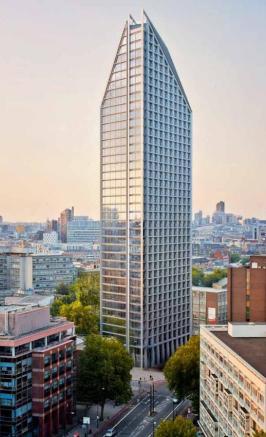Main author
Michael BrooksInterview with Liam Huntley - Commercial Manager
This is part of Student resources.
Liam Huntley is a Commercial Manager at Laing O'Rourke, who previously worked as a Quantity Surveyor for their Crown House Technologies branch.
Liam spoke to Designing Buildings Wiki about his career as Commercal Manager.
| Designing Buildings Wiki (DBW): How would you describe the role of a commercial manager? |
Liam Huntley (LH):
It's a very difficult role to describe because it changes every day. It depends on the stage of the project and what the client's key drivers are. But in general, I'd say the Commercial Manager's role covers all aspects of quantity surveying, cost and cash management, estimating, procurement and legal.
Day-to-day it involves identifying and managing risks, some negotiation, monitoring performance and focusing the team on the client's requirements and contractual obligations.
| DBW: What is the project you are currently working on? |
LH:
I'm working on a mixed use high rise development project in central London called Two Fifty One. It's made up of two towers; one a 40-storey apartment tower with various facilities and shops on the lower floors, and the other is a 7-storey commercial office tower.
| DBW: What is a typical day like as a commercial manager? |
LH:
There isn't a typical day. I don't think many people in construction have a typical day; and I enjoy that part of it. A lot of what you do is dictated by the stage of the project and the key tasks at that stage.
At the minute I'm working closely with the procurement team to agree scopes of work and negotiate contracts with our supply chain; and with the design and engineering teams to ensure we manage our design risks. In a few months time I'll be focusing more so on sub-contract management and programme delivery.
| DBW: What sort of training/education do you have? |
LH:
I did a full-time Commercial Management and Quantity Surveying degree at Loughborough University. It was a sandwich course, meaning I did a year on placement with my sponsor, Laing O'Rourke.
On completion, I joined Laing O'Rourke's Graduate Development Programme which provided specific training on the business and personal development. At the same time I completed an NVQ4 in Building Services to help with my technical knowledge of the various systems.
I then did a Masters in Construction Law and Dispute Resolution at Leeds Beckett University. And finally, I'm undertaking the Laing O'Rourke Young Guns leadership programme which is designed to help develop people into future leaders within the business.
| DBW: How did your university course prepare you for entering into this line of work? |
LH:
It was a very good course and provided an excellent grounding in a lot of topics. Inevitably it doesn't cover everything and there is still a lot to learn on the job, and some things you can only learn through experience; but it gives you the foundations to build upon. In many ways it teaches you how to be resourceful, to find the right information you need and to critically analyse.
| DBW: What is the one thing you wish you'd known before embarking on your career? |
LH:
That's a difficult question because I was very lucky as my dad also trained as a Quantity Surveyor, so I had someone to ask all the questions. But I'd stress to people making that choice not to be nervous about making a 'mistake' by choosing the 'wrong' career.
Firstly, no experience is a bad one, there is always something to be gained. Secondly, it's much easier to re-train and change your career than you think! Particularly in construction as there are a variety of roles and potential careers so the transition is easy.
| DBW: How does the role of commercial manager differ from your previous role as a QS? |
LH:
There isn't a significant or obvious difference, but it involves a greater breadth of roles such as more risk management, negotiation and monitoring performance. The main difference is moving from a 'doing' role into leading a team. I am involved in a lot more meetings and try to ask searching questions to ensure we're thinking about things holistically. Don't get me wrong, I still have reports to do every month!
| DBW: How you see BIM impacting on your role in the near future? |
LH:
Since I started there has been a lot of development in BIM, or digital engineering as we refer to it; and the benefits are starting to come through to the commercial teams as well as engineering.
We are using the model for coordination and clash detection, comparisons between models to identify changes and so on; which are predominantly engineering related but are useful commercially to manage change and mitigate risks. It is also useful for take-offs of quantities to populate orders.
The next stage will be populating the models with cost and programme data which I have seen but not yet used myself; I think there is a way to go to fine-tune BIM before the industry will be in a position to fully utilise it to its full extent, but that time is on the horizon.
| DBW: What skills or personal qualities are good to have as a commercial manager? |
LH:
That's another tough question, because I've met a lot of very different Commercial Managers who are all good at what they do, I don't think there is a right or wrong type of person.
Having said that, it's important to be able to lead a team. You therefore have to adapt to different people and understand others' view and what's important to them; that's the only way you'll be able to work together and build trust.
You also need to understand your client and what their key drivers are, ultimately they are your customer. Hand-in-hand in achieving this is ensuring that every decision on a project is made for the good of the project as a whole, not individuals and also having the foresight to predict issues before they arise and manage them well in advance.
| DBW: What do you enjoy most about being a commercial manager? |
LH:
I enjoy being able to get really involved with everything and have an impact and influence on how the project develops – the commercial function is affected by and affects design, procurement, legal, engineering, on site activities... everything.
[edit] Find out more
[edit] Related articles on Designing Buildings Wiki
- Commercial management.
- Commercial management and quantity surveying course essentials.
- Commercial manager.
- Construction contractor.
- Design manager.
- Interview with Harriet Latimer - Graduate Design Engineer.
- Interview with Stephen Trench - Project Manager.
- Leadership styles.
- Management consultant.
- Project manager.
- Project team for building design and construction.
- Quantity surveyor.
Featured articles and news
UKCW London to tackle sector’s most pressing issues
AI and skills development, ecology and the environment, policy and planning and more.
Managing building safety risks
Across an existing residential portfolio; a client's perspective.
ECA support for Gate Safe’s Safe School Gates Campaign.
Core construction skills explained
Preparing for a career in construction.
Retrofitting for resilience with the Leicester Resilience Hub
Community-serving facilities, enhanced as support and essential services for climate-related disruptions.
Some of the articles relating to water, here to browse. Any missing?
Recognisable Gothic characters, designed to dramatically spout water away from buildings.
A case study and a warning to would-be developers
Creating four dwellings... after half a century of doing this job, why, oh why, is it so difficult?
Reform of the fire engineering profession
Fire Engineers Advisory Panel: Authoritative Statement, reactions and next steps.
Restoration and renewal of the Palace of Westminster
A complex project of cultural significance from full decant to EMI, opportunities and a potential a way forward.
Apprenticeships and the responsibility we share
Perspectives from the CIOB President as National Apprentice Week comes to a close.
The first line of defence against rain, wind and snow.
Building Safety recap January, 2026
What we missed at the end of last year, and at the start of this...
National Apprenticeship Week 2026, 9-15 Feb
Shining a light on the positive impacts for businesses, their apprentices and the wider economy alike.
Applications and benefits of acoustic flooring
From commercial to retail.
From solid to sprung and ribbed to raised.
Strengthening industry collaboration in Hong Kong
Hong Kong Institute of Construction and The Chartered Institute of Building sign Memorandum of Understanding.
A detailed description from the experts at Cornish Lime.



























